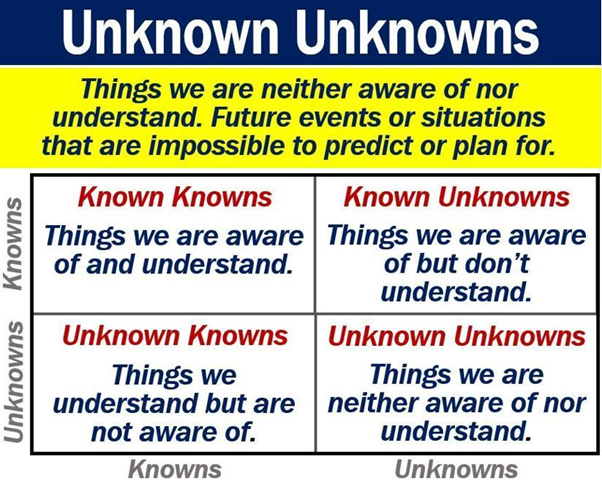We are often asked at DVC what exactly a transformative consultant does for its clients? What is it you offer to Corporates, Governments, Management Teams and NGOs? Well, amongst other consultancy services, put very simply, we help clients manage for the unknown unknowns.
So, What are unknown unknowns? Definition and examples.
Unknown unknowns are future outcomes, events, circumstances, or consequences that we cannot predict. We cannot plan for them either. We don’t even know when and where to search for them.
Unknown unknowns is a common term in strategic planning and project management. Project management involves planning, organizing, and managing many things, including a team to see through a project’s completion. Strategic planning is a company’s or organization’s process of defining its strategy.
We believe, however, by utilising our proprietary consultative system L. O. A.F. (Leadership and Organisation in Anarchic Flux) we can begin to analyse and asses what the unknown unknowns are.
BusinessDictionary.com has the following meaning of the term:
“Future circumstances, events, or outcomes that are impossible to predict, plan for or even know where or when to look for them.
Unknown unknowns — other knowns
Including unknown unknowns, four terms relate to the words ‘known’ or ‘unknown.’
Known knowns
This term refers to things that we are certain about, i.e., we know. For example, the US Pentagon knows how many American troops there are in the Middle East.

Many journalists say that when politicians use these ‘known’ terms, they are trying not to answer the question. Perhaps they also use them when they have no idea what right the answer is.
Known unknowns
Known unknowns refers to things we know exist, but we do not have all the information. We might not know, for example, how many of them there are.
For example, we know there are terrorists in the United States, United Kingdom, and France. However, we do not know how many there are. The number of terrorists in those countries is a known unknown.
Unknown unknowns
We know there are terrorists in our country (known known), but we do not know how many (known unknown).
We suspect they plan to do something in the future, such as set off a bomb or poison our water supply. However, we do not know what they will do, i.e., we have no idea. If they do something, we haven’t a clue when it will be. It is an unknown unknown. We are unaware of any terrorist plan. Put simply; we know nothing.
Unknown unknowns — Donald Rumsfeld
Donald Rumsfeld was US Secretary of Defense from 2001 to 2006. A journalist asked him a question regarding the lack of evidence linking Iraq’s government with the supply of weapons of mass destruction to terrorist groups. This was his answer:
“Reports that say that something hasn’t happened are always interesting to me because as we know, there are known knowns; there are things we know we know. We also know there are known unknowns; that is to say, we know there are some things we do not know.”
“But there are also unknown unknowns — the ones we don’t know we don’t know. And if one looks throughout the history of our country and other free countries, it is the latter category that tends to be the difficult ones.”
We believe, however, by using our proprietary process LOAF (Leadership and Organisation in Anarchic Flux), that we can work out the unknown unknowns.
“USE YOUR L. O. A. F.”
“All things are in a state of flux. Nothing is permanent but change “.
Heraclitus 535BCE
We at DVC Consultants think that the Greek philosopher had it pretty much right.
What do the brands Kodak, Blockbuster, Xerox, and Blackberry have in common? They all failed to heed Heraclitus’ advice and were overtaken by more innovative disruptor and challenger brands.
It is clear that Brands and their owning companies have no room for complacency, and need constantly to evolve or risk becoming extinct. DVC Consultants has therefore developed LOAF (Leadership and Organisation in Anarchic Flux) as a proprietary consulting process for supporting our clients in being disruptors and challengers, rather than being on the receiving end of companies more innovative.
It’s a four-part process designed to identify and analyse a wide range of different perspectives, and then to recommend actions on the back of that;
1. Leadership: To provide leadership you need to learn from many different perspectives — even those you might disagree with. We are expert in a range of fields, including political analysis, branding, economics, technology and financial services.
2. Organisation: Too often companies have the information before them, but key pieces of information are missed. Sometimes this is because people with one mindset are unable or unwilling to accept or understand what others are saying, and why. We are able to ensure that all key insights are kept in view, and synthesised and organised so they reinforce one another.
3. Anarchic To make sense of anarchy you need to analyse. There is no use in having the information to hand if it is not rigorously analysed and tested. Too often people do things on the basis of what they want to be true, rather than that which evidence suggests is true. We apply proper rigour — following Karl Popper — in analysing the challenges facing our clients.
4. Flux This needs fixing. Because we have worked in a range of industries, we know and understand how companies work, and the importance of making good ideas operate through day-to-day management structures, We are able, therefore, to support our clients in putting in place actions that will enable them to be the disruptors, not the disrupted.
Challenger and Disruptor brands succeed because they emerge from developments not properly observed by market incumbents. LOAF works because it builds on DVC’s expertise and experience in an eclectic and wide range of topics, including branding, economics, politics, government affairs consultancy and new technologies. This breadth allows us to help our clients in a number of ways:
- Disruptive Technologies blockchain has created a gateway to digital anarchy. It’s a catalyst that creates a new and different world. It represents a technological breakthrough that can sweep into obsolescence just about every existing business model. How are you prepared for this?
- Thought Leadership Programmes that enable disruptor and challenger brands to fill a connector space between product and people. That drives disruptive creativity through a company allowing all stakeholders, to experience this through, all touchpoints.
- Stakeholder Engagement and Measurement programmes to ensure measurable and ongoing dialogue. That allows management to set metrics and KPIs for employees to deliver disruptive strategies.
- Content Marketing Systems which provide end to end software platforms for serving the right content, at the right time, to the right people,
- Advisory Services for establishing management teams and networks that are best in class from their sectors and industries. This includes helping establish Board Advisory for a Start-up.
- Brand Roll Out Ensuring the successful introduction of the new brand to market by co-ordinating all the marketing disciplines to maximise the brands release.
LOAF has recently been used to create the FinTech disruptor banktotal, which is focused on bringing banking to the underbanked and unbanked in emerging economies. It uses blockchain and cloud-based technology systems, to streamline retail banking for emerging economies.
So if any of this strikes a chord, and you want to use your L.O.A.F contact Meg on meg@dvcconsultants.com and we can see how we help you disrupt, rather than be disrupted.




0 Comments